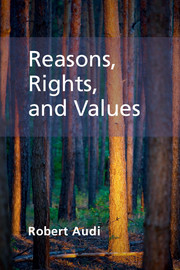Book contents
- Frontmatter
- Contents
- Preface
- Acknowledgments
- Introduction: practical reason, moral justification, and the grounds of value
- PART I REASONS FOR ACTION
- PART II INTUITION, OBLIGATION, AND VIRTUE
- 5 Intuitions, intuitionism, and moral judgment
- 6 Kantian intuitionism as a framework for the justification of moral judgments
- 7 Moral virtue and reasons for action
- 8 Virtue ethics in theory and practice
- PART III RELIGION, POLITICS, AND THE OBLIGATIONS OF CITIZENSHIP
- Index
- References
6 - Kantian intuitionism as a framework for the justification of moral judgments
from PART II - INTUITION, OBLIGATION, AND VIRTUE
Published online by Cambridge University Press: 05 May 2015
- Frontmatter
- Contents
- Preface
- Acknowledgments
- Introduction: practical reason, moral justification, and the grounds of value
- PART I REASONS FOR ACTION
- PART II INTUITION, OBLIGATION, AND VIRTUE
- 5 Intuitions, intuitionism, and moral judgment
- 6 Kantian intuitionism as a framework for the justification of moral judgments
- 7 Moral virtue and reasons for action
- 8 Virtue ethics in theory and practice
- PART III RELIGION, POLITICS, AND THE OBLIGATIONS OF CITIZENSHIP
- Index
- References
Summary
Intuitionism in ethics has often been thought to lack a way to unify the plural standards it endorses. It has also been taken to have at best meager resources for explaining how we should resolve conflicts between prima facie obligations. On this resolution problem, W. D. Ross appealed to Aristotelian practical wisdom. He argued that neither Kantian nor utilitarian ethics (the two most promising rival views he considered) offers an adequate alternative. There is, however, an interpretation of Kant's Humanity Formula of the Categorical Imperative for which this negative assessment is unduly pessimistic. This paper will show why. I am not implying, however, that dependence on Aristotelian practical wisdom in certain cases is a fatal defect in a Rossian intuitionism. There are, moreover, many cases of conflicting obligations for which, even if practical wisdom is required for their resolution, there is no reasonable doubt about what should be done. In any event, no plausible ethical theory makes dealing with conflicts of obligation easy or uncontroversial; and dependence on practical wisdom is a central element in any virtue ethics and, in some ways, indispensable for practical ethics even when it is guided by a plausible moral theory of some other kind. My aim, then, is not to eliminate dependence on practical wisdom but to construct a broadly intuitionist ethical theory that helps us to enhance both the unity and the applicability of the intuitively acceptable moral principles it provides. Doing this will bring more resources to guide practical wisdom than Ross and later Rossian intuitionists have provided.
I Kantian intuitionism as an integrated view
In early twentieth-century intuitionism, as in much earlier intuitionist writings, three ideas have been salient. First, basic moral principles have been held to be self-evident. Second, self-evident propositions have been claimed to be unprovable. Third, as suggested by the unprovability claim – which brings to mind the idea of propositions so basic as to be Aristotelian indemonstrables – the self-evident has been represented as a category of propositions whose truth a mature rational person can “just see” and can know only by such immediate insight.
- Type
- Chapter
- Information
- Reasons, Rights, and Values , pp. 160 - 181Publisher: Cambridge University PressPrint publication year: 2015



